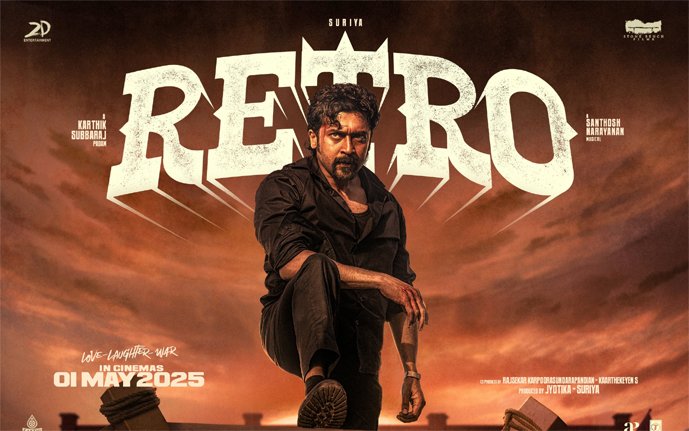INVC NEWS Hyderabad — In Retro Movie, Suriya doesn’t just act—he awakens emotion. With every glance, every line, every pause, he breathes life into a hauntingly beautiful tale that dares to travel across decades. Directed with surgical precision and poetic sensitivity by Karthik Subbaraj, Retro isn’t a film—it’s an experience, a time capsule of human pain, love, and lost revolutions.
This is not your typical time-travel drama. This is Tamil cinema’s heart meeting its intellect, draped in the aesthetics of another era yet pulsing with contemporary urgency.
Suriya’s Magnum Opus: A Performance That Redefines His Legacy
Arjun, Suriya’s character, is a complex mosaic—half idealist, half ghost. Whether he’s playing the passionate firebrand of the 1970s or the scarred, contemplative recluse of the present, Suriya delivers a layered, masterful performance that commands attention in every scene.
There’s an aching tenderness in his portrayal, especially in moments of silence. He doesn’t act through dialogue alone—he performs with his eyes, his stillness, his broken smile. This is not just acting; this is embodied storytelling.
Critics and cinephiles are already hailing Retro as “Suriya’s finest performance to date”, and it’s easy to see why.
Delivers Her Career-Defining Role
As Meera, the film’s emotional axis, Pooja Hegde brings astonishing depth, dignity, and power. Far from a conventional love interest, she plays a fiercely independent journalist whose choices shape history and destiny alike.
Her chemistry with Suriya is not explosive—it’s soulful. It’s the kind of pairing that reminds you why we watch cinema: to feel the unsaid, to believe in broken hearts finding meaning again. This is, hands down, Pooja’s most mature and affecting performance yet.
Karthik Subbaraj’s Direction Is a Masterclass in Narrative Craft
With Retro, Subbaraj pulls off the near-impossible: a film that’s both intellectually ambitious and emotionally devastating. He explores themes of memory, regret, and political disillusionment with the subtlety of a poet and the sharpness of a satirist.
There’s a meta-layered storytelling rhythm at play here—the past informs the present, and the present reinterprets the past. Yet Subbaraj never lets the viewer feel lost. He trusts the audience, and in return, earns their awe.
This is Subbaraj’s most evolved work, where form, function, and feeling fuse seamlessly.
Music by Santhosh Narayanan: A Soundtrack That Feels Like Time Itself
Santhosh Narayanan doesn’t compose background music—he sculpts emotional architecture. Every note in Retro feels handcrafted to echo the soul of a scene. Tracks like “Uyire Vaa” linger in the heart long after they fade, while the ambient score during the film’s climax is nothing short of breathtaking.
This is one of the best soundtracks in modern Tamil cinema, not just in melody but in emotional precision.
Visual Brilliance: Cinematography That Captures Time Like a Memory
Shot by the veteran Tirru, Retro is as much a visual poem as it is a narrative film. The 1970s are bathed in golden grains, while the present is filtered through blue-gray desaturation, capturing the cold weight of unresolved trauma.
Each frame is meticulously composed, and yet feels organic—like a photograph you stumble upon in a forgotten attic. This isn’t just aesthetic flourish; it’s visual storytelling with heart.
What’s Good: Everything That Makes Cinema Timeless
Suriya’s magnetic performance, a masterclass in restraint and revelation
Pooja Hegde’s emotionally resonant arc, both political and personal
A script that’s bold, political, and poetically structured
A soundtrack that carries the emotional pulse of the film
Sharp editing and clean transitions across timelines
An emotionally walloping climax that leaves the viewer in stunned silence
What’s Not: A Film That Demands Patience, Not Popcorn
Requires viewer attention—not ideal for casual or distracted audiences
Some viewers may find the political layers too nuanced or underexplained
The slow-paced first act might deter those expecting immediate thrills
Audience Verdict: An Instant Classic
Social media is ablaze with praise. Fans have called Retro “a masterpiece of emotion and memory,” while critics are labeling it “the most intelligent Tamil film of the year.” Trending hashtags like #SuriyaInRetro, #RetroReview, and #TimeBendsWithSuriya are proof of the film’s resounding emotional impact.
Many are already calling for national awards, especially for Suriya’s staggering dual-era portrayal.
Final Word: Retro Isn’t Just a Movie—It’s an Emotion Etched in Celluloid
In Retro, we don’t just watch a story—we relive wounds, regrets, and fleeting joys that echo across generations. Suriya gives his heart, Pooja anchors the soul, and Subbaraj orchestrates a symphony of time and tenderness.
This is the kind of cinema that reminds us why stories matter, and why some films don’t just entertain—they stay with us.
Rating: ⭐⭐⭐⭐⭐ (5/5) – A Time-Bending Masterpiece That Defines a Generation.
















